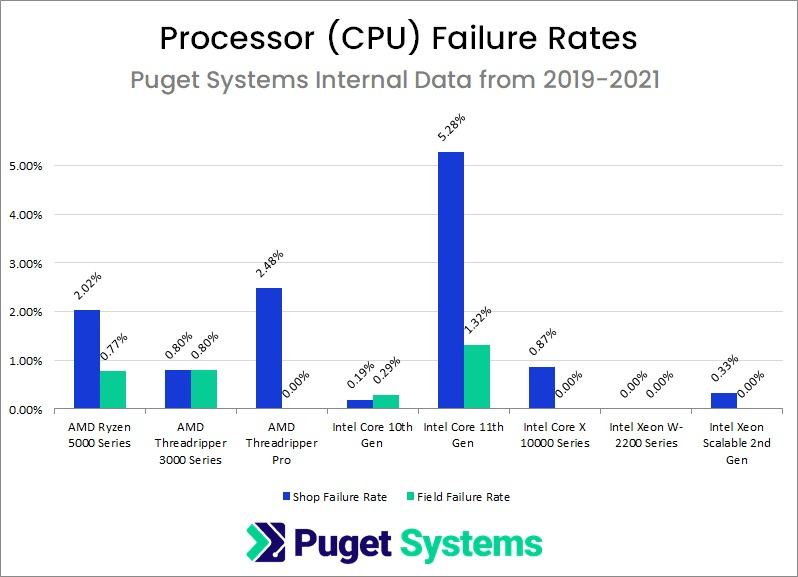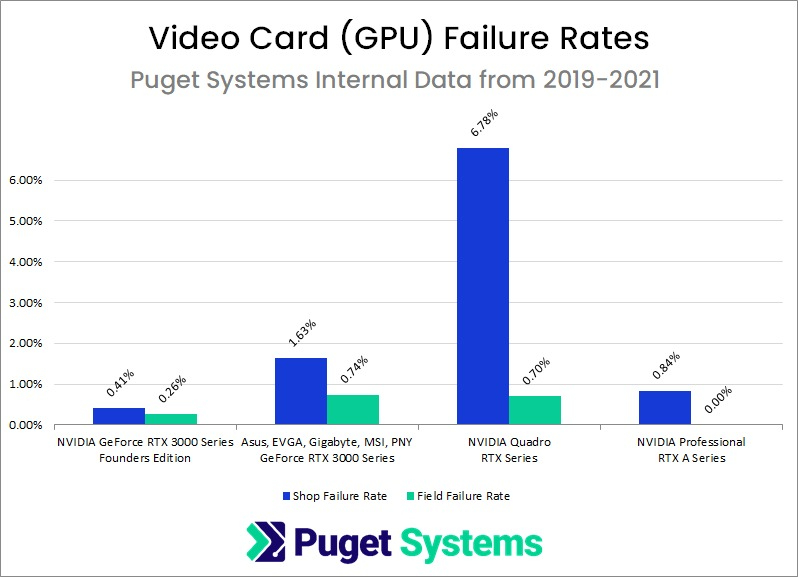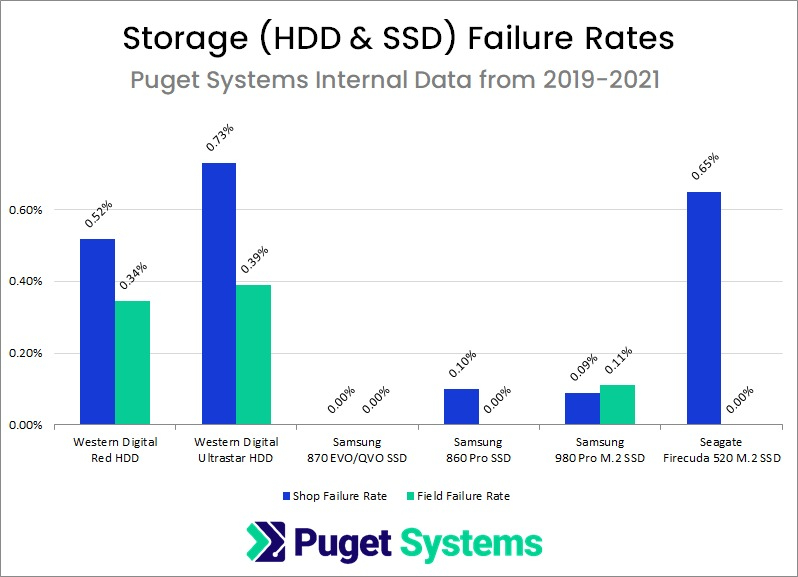Puget Releases Hardware Reliability Report: CPUs, GPUs and SSDs
Samsung SSDs have a shockingly low failure rate according to Puget Systems.
When it's time to buy new components for your gaming rig, or if you happen to buy a prebuilt system from an established brand or boutique company, you hope and pray that the hardware will last for the long haul. But, unfortunately, due to production defects, user error, bad luck, or a combination of all three, some hardware ends up failing prematurely. With this in mind, the folks at Puget Systems have amassed some rather intriguing data on what it found to be the most reliable hardware for the custom workstations/servers that it sold during 2021.
Before we even get started with the data, we should caution that companies like Intel, AMD, and NVIDIA (among others) don't provide their failure rates to the public (for obvious reasons). So, we must look at this data through Puget's lens and not make too many inferences on the entirety of the PC hardware market based on their analysis.
Puget also posits that its failure rates, in general, should be lower than the industry average due to its "comprehensive qualification process" and the high-quality components that it uses -- granted, this is something that all systems builders strive to achieve. And this statement from the company is a big one that should set the tone for the accumulated data: "We are filtering out of this data any failures that we believe were caused accidentally by our employees or customers, as well as those related to damage in shipping. The goal here is to isolate problems from the hardware itself, rather than human error."

With that said, Puget's failure analysis (with data from shop and field failures) covers processors, memory, video cards, HDDs/SSDs, and power supplies. Regarding processors (which are lumped together based on series to simplify things), we see that Intel's 11th generation Core processors lead the way with overall failures as a percentage of chips acquired. The shop failure rate, which means that Puget caught them in the lab before systems shipped to customers, was 5.28 percent (more than double the rate of the AMD Threadripper Pro). However, the failure rate in the field was still higher than the rest of the lot at 1.32 percent (the Threadripper 3000 was the next closest with a field failure rate of 0.80 percent).

However, the 11th generation (Rocket Lake) Core failure rates were considered an extreme oddity given that the 10th-Gen Core, Core X, and Xeon W/Scalable processors were well below their AMD counterparts (less than 1%). We don't know what the issue could be, although perhaps the high thermals of Rocket Lake processors were to blame. And as you might imagine, it's simply too early to amass reliable data on new 12th-Gen Alder Lake processors.
The graphics card category is notable for its lack of AMD Radeon/Radeon Pro GPUs (Puget's customers seem to have an affinity for NVIDIA GPUs instead of AMD). Of the NVIDIA cards sold, Puget pulls from several vendors, including Asus, EVGA, Gigabyte, MSI, NVIDIA, and PNY. Not surprisingly, among the RTX 30 Series graphics cards, the NVIDIA units proved to be more reliable than offerings from their board partners.
However, an oddity here is the extremely high failure rate for Quadro RTX GPUs, which Puget could explain easily. "It is almost entirely because of a manufacturing problem with the USB-C "VirtualLink" port on RTX 4000 video cards," the company explained. "All of them we received from May 2020 onward were defective, so huge swaths of our inventory of those cards failed our testing here - and for a long time after that discovery, we stopped offering them at all." In total, the 15 percent failure rate for the Quadro RTX 4000 was enough to tank the numbers.
Get Tom's Hardware's best news and in-depth reviews, straight to your inbox.

Regarding storage devices, Western Digital HDDs, in general, had a higher failure rate (capped by a 0.73 percent shop failure rate for the Ultrastar) than SSDs from Samsung. However, the outlier on the SSD front was with the Seagate Firecuda 520, whose shop failure rate hit 0.65 percent. Luckily, none of those SSDs that shipped to customers failed. The big winner here was Samsung (870 EVO/QVO) which had zero failures in the shop or in the field.
As we mentioned earlier, this data is interesting to look at it but should not be considered representative of the broader PC hardware market. In the end, Puget crowned Samsung's SSDs as its "most reliable hardware" given the low failure rates. According to the company, "over the entire history of Samsung SSDs in our records, we have sold over 35,000 drives and had less than 100 of those fail."

Brandon Hill is a senior editor at Tom's Hardware. He has written about PC and Mac tech since the late 1990s with bylines at AnandTech, DailyTech, and Hot Hardware. When he is not consuming copious amounts of tech news, he can be found enjoying the NC mountains or the beach with his wife and two sons.
-
kinney I've always stuck with Intel or Samsung SSDs. I have an Intel X25-M 160GB still going to this day, which was replaced by a Samsung 960 Pro 1TB. Since Intel gave up the high end, I'm all Samsung till further notice and plan on a 990 Pro 2TB.Reply -
fireaza The failure rate for CPUs sorta took me by surprise. I worked at a PC hardware store many years ago, and I don't recall ever seeing a D.O.A CPU. I figured that the companies must have been extensively testing them beforehand to weed-out any dead ones.Reply